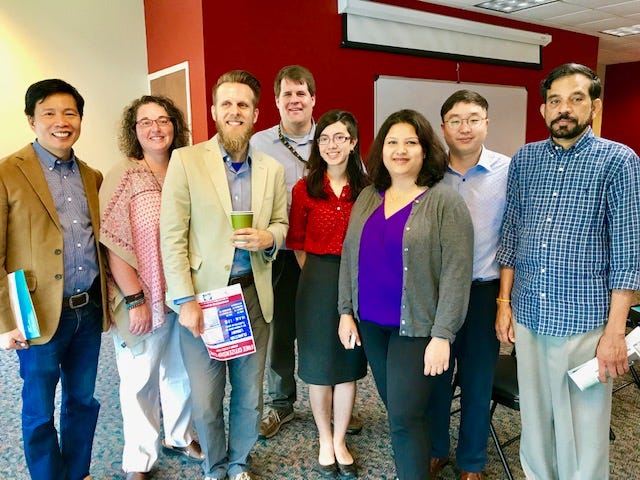Last June, Mayor Edward Terry walked into the Clarkston Community Center’s meeting hall for a panel discussion on the upcoming census. The hall was packed with community leaders, legislators, refugees, and immigrants. For a small city located east of Atlanta, Clarkston has become the most ethnically diverse square mile in the United States.
“I am truly honored to welcome you to our city, known as the Ellis Island of the South,” Terry said. “The ethnic media in this room plays a very important role to inform our residents who come from every corner of the world.”
Since the mid-70s, Clarkston has welcomed Somalis fleeing civil war, Bhutanese fleeing ethnic cleansing, as well as Cambodians, Nepalis, Croatians, Eritreans, and Liberians escaping violence and religious persecution in their home countries. Now, as Clarkston continues to attract refugees and immigrants from Asian, Central American, and African nations, the city — and metro Atlanta as a whole — has become one of the major hubs of ethnic media in the country.
“Every day, we have programs that are aired in at least 10 languages. And the hosts, mostly volunteers, also have first-hand knowledge of the cultural nuances of their own communities,” said Hussein Mohammad, a founding member and former director of Sagal Radio, a small Clarkston-based radio station that broadcasts in Swahili, Sino-Tibetan, Tigrinya, and Arabic, to name a few.
Recently arrived immigrants from South Korea have also made metro Atlanta their home.
“You go to Duluth [which is part of Gwinnett County, about 27 miles from Atlanta city center], you would think you are not in the Deep South. With rows and rows of Korean establishments, and hundreds of thousands of Koreans who live there, it feels more like Seoul,” said Jong Won Lee, former editor of Korea Daily. “If you speak English, you’d be the minority.”
Notably, metro Atlanta has a huge Korean ethnic media market, perhaps on par with those in Los Angeles and New York. In Gwinnett County alone, the Korean population increased by 155 percent from 2000 to 2017. These numbers don’t take account undocumented Korean immigrants, who tend to be undercounted. When I spoke with Eugene Rhee, Program Director of the Center for Pan Asian Community Services, several years ago, he underscored that the community has a different count of Korean population. By their estimates, there has been a 1,000 percent increase in the Korean population in Duluth — or Gwinnett County — over the last 15 years.
The Atlanta area now has four major Korean news outlets — three dailies (Korea Daily, Korea Times, and Chosen Daily) and a television station WKTB-CD, which is owned by Korean American TV Broadcasting.
The Chinese immigrant population has also been growing quickly, and so are Chinese-language publications. Less than a decade ago, The World Journal was the only Chinese-language publication in the area. Now, there are three other Chinese newspapers within the city limits, namely Atlanta Chinese News, China Tribune, Duowei Times, and The Epoch Times — the Chinese-American media network that covers 21 languages and 33 countries.
“More and more Chinese people are moving into Atlanta and buying properties. They think that Atlanta has more affordable real estate properties, better weather and friendlier people,” said Lily Lee, former publisher and editor of The World Journal Atlanta. “Soon, we will have our own Chinatown here.”

And according to the Pew Research Center, Atlanta ranks 19th among the sixty largest metro areas in the country for total Hispanic population. Nearly 600,000 Hispanics reside in the area; they represent about 11 percent of metro residents, and over half of the almost million Hispanics in Georgia overall.
Mundo Hispanico, the largest Spanish-language weekly in Georgia — and across the Southern states — has expanded its distribution and operation to North Carolina, South Carolina, Alabama, and Florida. Formerly owned by Cox Communications, Mundo Hispanico has been shifting to digital, according to its editors.
The other Spanish-language publication, El Nuevo Georgia, has also been thriving, along with television stations Telemundo Atlanta and Univision 34.
Given the long history of African Americans in the South, the oldest media outlets in Atlanta are black newspapers. The Atlanta Daily World was founded in 1928 and The Atlanta Voice in 1956. Both played a significant role during the start of the Civil Rights Movement in the Deep South and continue to serve thousands of readers in the city today.
Despite some punitive, anti-immigration laws in Georgia, Teddy Dagwe, publisher of Dinq Magazine, a monthly that serves both the Christian and Muslim Ethiopian communities in metro Atlanta, says that immigrant communities continue to thrive in the area.
“We have each other here in big numbers. And it makes a difference when you have someone like Mayor Terry who understands us, who lives with us, and who listens to us,” Dagwe said.

Many see Clarkston and the greater Atlanta area as a bright spot in the national landscape — a place that has continued to welcome immigrants and refugees, where ethnic media and civic leaders are actively engaging with these communities to respond to their news and information needs.
Oni Advincula was a former editor and national media director for New America Media and a correspondent for The Jersey Journal. Currently, he works as a media consultant and and a freelance journalist. He is the co-author of “The State of Ethnic and Community Media in New Jersey” and has worked with ethnic media in 45 states for more than 20 years.